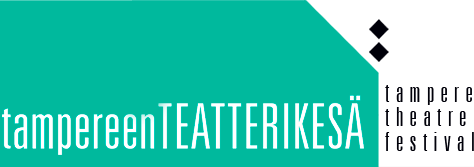The First 50 Years of the Festival
The Birth of Tampere Theatre Festival
1968–1989
When Finnish theatre got its own festival, Tampere was a natural choice with two strong theatres, Pyynikki Summer Theatre with its world-renowned rotating auditorium and a local journalist, Olavi Veistäjä (known also as Parras) who was passionate about theatre. Tampere Theatre Festival was born from this combination.
The Festival got a push from the cultural revolution of the 60’s. During this time period, various new festivals sprouted up and in the midst of this wave, Olavi Veistäjä presented the idea of the Theatre Festival to the City’s Mayor Erkki Lindfors. During the autumn of 1968, Tampere City Council became the founding member of the Festival and started to make plans for the event to take place in August the following year. The other founding members were The Theatre Club of Tampere, TTT Theatre, Tampere Theatre and two actors unions. The goal was to present an overall view of Finnish theatre and this is exactly what happened. The festival offered an opportunity to compare and create an overall picture of Finnish theatres. The festival was also an ideal setting for seminars, discussions and meetings.
The budget for the first Festival forced the organisers to limit their selection to local talent, which gave the amateur theatres the opportunity to join in. The real surprise did come from the amateurs; a big hit amongst both the audiece and the critics was Tampere Pop Theater’s sensational musical, Hair, which was an economic saviour as well.
Olavi Veistäjä’s season was formed from four three-year-periods. The first period introduced Finnish Theatre and the Festival soon became national. The plays were mainly Finnish in the mid 70’s, and in the late 70’s the Festival concentrated in the ”Best of theatre year”. The last 3-year-period was named ”The review of reforming Finnish Theatre”. Some selected theatres brought more than one of their plays to the festival to show their versatility. There were also some international visitors.
Veistäjä had no prejudice with his programme choices. Even when he was 70, he was full of innovative ideas for the festival, but he also stayed realistic. He understood that the Festival would die out if the ideas – themes and performances – didn't draw in the audiences.
Olavi Veistäjä was helped by an Executive Committee, (1969-1989) with members like Leena Lindfors, Simo Tavaste, Kai Savola, Rauli Lehtonen, Simo Johansson, Veli Sandell, Lasse Pöysti, Hannu Partala, Kaarina Suonio, Leena Vihola, Esko Roine, Mikko Majanlahti and Aila Manninen. Veistäjä’s closest associate was the Executive Director, Veli Sandell.
The Festival was important to Veistäjä from the beginning to the end - he controlled its finances better than his own. In 1987 he withdrew from the roles of Debuty Chairman and Chairman of the Executive Committee after 19 years. Headlines screamed ”A Vacancy for the Pope”, theatre makers were shocked. The Executive Director, Sandell resigned as well.
For a year the Festival was led by the Executive Director Markku Kontro.
Tampere Theatre Festival Becomes International
1989–1994
The grand old lady of the theatre world, Vivica Bandler, took the reigns in her hands in 1989. New winds blew during Bandler’s season as the Artistic Consultant and Artistic Director of Tampere Theatre Festival. The ”local feeling” disappeared and the festival became a fresh mixture of Finnish, Scandinavian and other international theatre. Like Veistäjä, Bandler was a strong personality and didn’t lack ideas. Having worked abroad for a long time, Bandler was one of the most innovative characters of the theatre world and made Tampere Theatre Festival truly international.
Together with the Executive Director, Leena Vihola, she marketed the Festival more efficiently and especially international contacts were multiplied. International press got interested and in addition to that, international festivals came over to source productions for them. More professionals from different sectors of theatre arrived year after year, when the word spread of the individual programme.
It was decided that the programme shouldn’t be limited into certain themes. It should be given a chance to breathe easily and reflect the phenomenona of the time. Vivica Bandler built a strong bridge between Scandinavian countries and Europe. ”Vivica’s kitchen” was a well known concept around the world, where theatre folk, including the likes of Bertolt Brecht, had discussions about culture and planned the Festival programme.
Bandler’s goal was to organise a festival that attracts its audience from Tampere and surrounding areas, as well as nationwide. These goals, which were successfully met, created a foundation for the event. It included a varied and high quality programme – the foundation that enabled the group of three and the new Executive Director to develop the Festival further.
Tampere Theatre Festival – the present
1995–2018
After Vivica Bandler’s distinguished season, the Executive Director of Theatre Center, Raija-Liisa Seilo, was chosen to be the Executive Director of Tampere Theatre Festival and the artistic team developed a functioning system that still operates: A team of three or two people together with the Executive Director are in charge of the programme. Their task is to view hundreds of theatre performances and choose the best ones through a tight sieve. After Raija-Liisa Seilo’s season, the Executive Director of Dance theatre Mobita/Dansco, Hanna Rosendahl, was chosen to be the next Executive Director of Tampere Theatre Festival in 2007.
At present the proportions of the Festival are completely different from the beginning. The programme is more extensive and number of performances has increased dramatically – alongside with the audience numbers. The Festival has changed from Olavi Veistäjä’s small team to an organization with proficient people from different professions who work together with the valuable volunteer workers.
The fundamental principle of Tampere Theatre Festival has been preserved: In Tampere we see an extensive selection of the best Finnish theatre. In addition it is possible now to see an international programme, which has covered a third of the Main Programme since Vivica Bandler’s season. Over the fifty years Tampere Theatre Festival has risen to be one of the most significant festivals in Scandinavia and the Northern Europe.






















